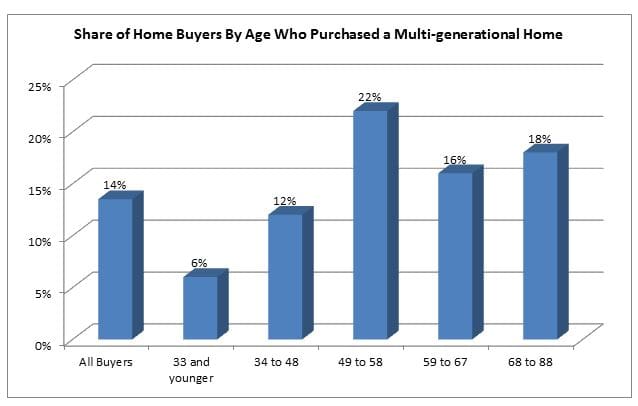Moving in with Elderly Parents? Here’s Everything You Need
- Published on
-
 Michelle Nickolaisen Contributing AuthorClose
Michelle Nickolaisen Contributing AuthorClose Michelle Nickolaisen Contributing Author
Michelle Nickolaisen Contributing AuthorMichelle holds a B.A. in Fashion Design and Marketing from Missouri State University. She has over 10 years of experience writing on everything from real estate to small business and technology. Her work has been featured in Entrepreneur, Fast Company, Intuit QuickBooks, MediaBistro, and other publications.
Multi-generational households are on a swift upward trend, with one AARP study showing the number of multi-generational households increasing by about one million between 2008 and 2010 (more than the eight years before that combined!). Not only that but it looks like more and more people above the age of 50 are purchasing them.

Whether one or both of your elderly parents are moving back in with you due to health, finances, some combination of the two, or for some other reason entirely, there’s a lot to think about as a result.
- What do you do with their old house?
- What are the financial implications and are there any tax considerations?
- How do you maintain boundaries, without slipping into old patterns?
First, You Have to Make the Call
Does your parent even need to move in with you? They might just need in-home care or other help.
Here are a few things to consider:
Are they having trouble preparing their own food?
Arthritis and other mobility issues can make cooking difficult, but services like Meals on Wheels, or even Blue Apron or Plated, (if their mobility issues are less severe) can solve that problem.
Are they having severe mobility issues?
If they can’t get up or down stairs, or walk normally, in-home care (or them moving in with you) might be necessary. Depending on the severity of the problem and your ability to make modifications to their home, accessibility modifications like an electric chair lift for their stairs could be a good step in the meantime.
Are they having cognitive issues?
If your parent has suffered a stroke or is developing dementia, they will likely need someone around 24/7 to make sure they don’t do anything that could harm themselves.
If you do decide to go the in-home care route, sites like Seniorly can help you find a service provider and we published a few tips on how to help your parents downsize.
The sooner you start talking about these issues with your parents, the better. That way, if or when the time comes where they do need to move in with you or have a caregiver, you don’t have to bring it up for the first time when it’s a pressing issue.
When you have these discussions, choose specific metrics (“When I can’t do X, I will need a caregiver”), and use those metrics as ways to guide the future discussions.
For example, you could say “I noticed you’re having a hard time with X…” then refer back to your previous conversations.
What to Do With Your Parent’s Old Home
If your parent was a homeowner before moving in with you, you’ll have to do something with their old home. If it’s feasible due to your current life factors (you’re renting, or you don’t have children living with you right now, etc.), and they have the space for you to live there, moving in with them can be one solution that gets them the care they need, without the hassle of selling a home.
If your parent moving in with you is the only option, then you’ll need to do something with the vacant house. Selling is the obvious route, and you’ll probably want to find a good real estate agent to help out with this process, especially as it’s likely that emotions and stress will already run high.
Renting is an option and might be a good way to recoup some of the costs that you’ll take on from having another person in the house (and possibly having to make changes to your home to accommodate them).
Before going the rental route though, make sure that you’re up-to-date on the latest laws about being a landlord in your state, and what your responsibilities will be.
Money, Accessibility, and Taxes
Aside from the potentially fraught emotional topics, there’s plenty of practical things to think about as well:
Potential costs involved when moving elderly parents
Depending on how able your parent is to get around, you might have to redo some parts of your home. Namely, it’s recommended that doorways be at least 36 inches wide to easily accommodate a wheelchair or walker.
Consumer Reports estimates that widening them can cost between $500 and $5,000, depending on your home and the construction needs. You can also install swing-clear hinges, which let doors open entirely out of the doorframe and cost between $20-100 per hinge. Installing an electric chair lift for the stairs usually runs about $5,000-10,000. To help out with these changes, you can find certified aging-in-place specialists near you.
There are, of course, other costs — increases in food costs and potentially increases in utilities. If you’ll be taking a cut in your work hours to take care of your parent, there’s the potential decrease in salary, although you might also negotiate with your boss about working remotely full or part-time to give you more flexibility and let you keep the same salary.
Salary.com and the Daily Muse both have articles with tips on how to negotiate a telecommuting arrangement.
There’s also the potential cost of hiring in-home help, which might or might not be needed. The MetLife Mature Market Institute puts the average cost of a home health care aide at about $21/hr or $21,840 a year.
For a better estimate, check out NPR’s state-by-state breakdown of the average costs for home care.
Financial factors that depend on your situation
Unless the parent is paying rent, any social security benefits they’re receiving will be reduced by 1/3, because SSI treats free room and board as “in-kind support and maintenance.” Medical costs can skyrocket in elderly years, and you’ll want to talk to your parent about their insurance and what it covers or doesn’t cover, their Medicare or Medicaid coverage and what’s covered underneath that (and how to sign up for it, if they haven’t already).
You’ll want to talk about how to split the total cost if medical costs exceed the coverage benefits — and whether or not you’ll take them on in full.
As an FYI: Double check the laws in your states.
“More than half of U.S. states have so-called filial responsibility laws, which say adult children are responsible for caring or financially helping parents who are unable to pay for care. These statutes have roots in American colonial and 16th-century English laws aimed at relieving elderly poverty.” According to Nerdwallet.
“Such laws remain on the books in Alaska, Arkansas, California, Connecticut, Delaware, Georgia, Indiana, Iowa, Kentucky, Louisiana, Maryland, Massachusetts, Mississippi, Montana, Nevada, New Hampshire, New Jersey, North Carolina, North Dakota, Ohio, Oregon, Pennsylvania, Rhode Island, South Dakota, Tennessee, Utah, Vermont, Virginia and West Virginia, and in the territory of Puerto Rico.”
Luckily, they’re rarely enforced.
How Living with Parents Affects Your Taxes
There are a few different ways that having a parent live with you can affect your taxes:
- If your parent is paying you market-rate rent, you’ll have to declare it on your Schedule E form when you file your taxes.
- Any additional expenses you have as a result of their stay (higher bills for electricity, or increased food costs), can be counted against that income.
- If you’re claiming your parent as a dependent, they can’t earn more than $3,950 a year (not counting social security payments). You also have to cover more than half of their expenses for the year. For more on the rules around dependents, look at IRS Publication 501.
- You might also be eligible for tax deductions for expenses like dentures, hearing aids, walkers, and the cost of transporting the parent to the doctor, but these will vary depending on state and other details, so it’s best to consult an accountant.
- If you have siblings, and no one covers more than half of your parent’s support fees, but you each contribute at least 10%, only one of you can claim your parent as a dependent that year using form 2120. The other siblings will need to sign a document saying they waive any tax-exemption claims for that year.
How to Prepare Yourself Emotionally
There are practical considerations as well, but if you aren’t prepared emotionally, having your parents move back in can be a rough transition. Here are a few tips to make it easier:
Keep an eye out for old patterns.
When you live with people that you haven’t lived with for decades, old patterns of behavior can show up. If you and your parent used to fight about a particular household issue, that might come up again. Or if one of your siblings is around more to help out with your parent, you might find yourself revisiting childhood fights. Simply being aware of these patterns can help you avoid them and defuse the situation.
Practice your communication skills.
With everyone in the house, all the time — your children, your spouse, your parent(s). If you need extra support from your spouse, ask for it, and also make sure to check in with them to make sure they aren’t feeling neglected.
It can be useful to practice skills like nonviolent communication to get better at wording your questions and comments in a way that won’t be perceived as angry or on the offensive.
It’s also a great idea to give everyone their own personal space that they can retreat to when they need to and clearly acknowledging that as personal space (i.e. if your parent is in their room with the door shut, you’ll respect their personal space and not intrude unless necessary).
Brace yourself for common emotions and actions.
Your parent is used to taking care of you and being in a position of authority, and now that authority has been removed. It can be a huge blow to someone’s dignity to not just admit that they need help, but accept it. So if you see the occasional angry outburst, know that it’s normal.
“Even in the midst of a loving family, an aging parent may feel a real sense of loss of independence and autonomy. That sense of loss may crop up in odd ways, such as resistance or controlling behavior around food or housekeeping routines,” notes Jody Gastfriend, vice president of Care Management at Care.com and LICSW (Licensed Independent Clinical Social Worker).
You might also find that your parent is talking more with your spouse than with you — it’s because they don’t share the same emotional baggage together that you and your parent do, and your parent was never in a position of authority over them. It’s easy to feel hurt by this, but it’s also a totally normal reaction.
Have reasonable expectations.
Sometimes, towards the end of their life, a parent might open up emotionally, express regrets, or talk about how much they love their family. Sometimes, that doesn’t happen at all. If you bond with your parent in that way as you take care of them, that’s great — but setting your expectations that high can lead to feeling disappointed and hurt later if they don’t actually open up in those ways.
Depending on how emotionally fraught the situation becomes, it might be worth it to look at therapy or mediation for some or all of your family. If you need some help navigating the situation, services like TalkSpace or BetterHelp can give you access to a therapist at a greatly reduced cost to in-person therapy.
Going Forward…
Before you finalize the move-in details, make sure to create a financial and emotional plan for how you’ll be handling the transition and discuss both plans with not just your parent but also with your other family members (both in the household and out of it).
